Healthcare Case Studies: Ethical, Legal, and Practical Challenges
VerifiedAdded on 2022/08/19
|11
|2870
|25
Case Study
AI Summary
This assignment presents three healthcare case studies focusing on ethical and legal dilemmas in patient care. The first case examines the reluctance of parents to immunize their child and the ethical considerations of autonomy and non-maleficence, discussing relevant government policies and strategies for addressing parental concerns. The second case explores the complexities of a minor's risky sexual behavior and a Chlamydia diagnosis, considering issues of confidentiality, autonomy, and beneficence, alongside relevant legislation and approaches for counseling and family therapy. The final case analyzes a situation involving domestic violence and substance abuse, addressing mandatory reporting requirements, parental autonomy, and the need for a holistic care approach, including building relationships, verifying claims, and providing support services.
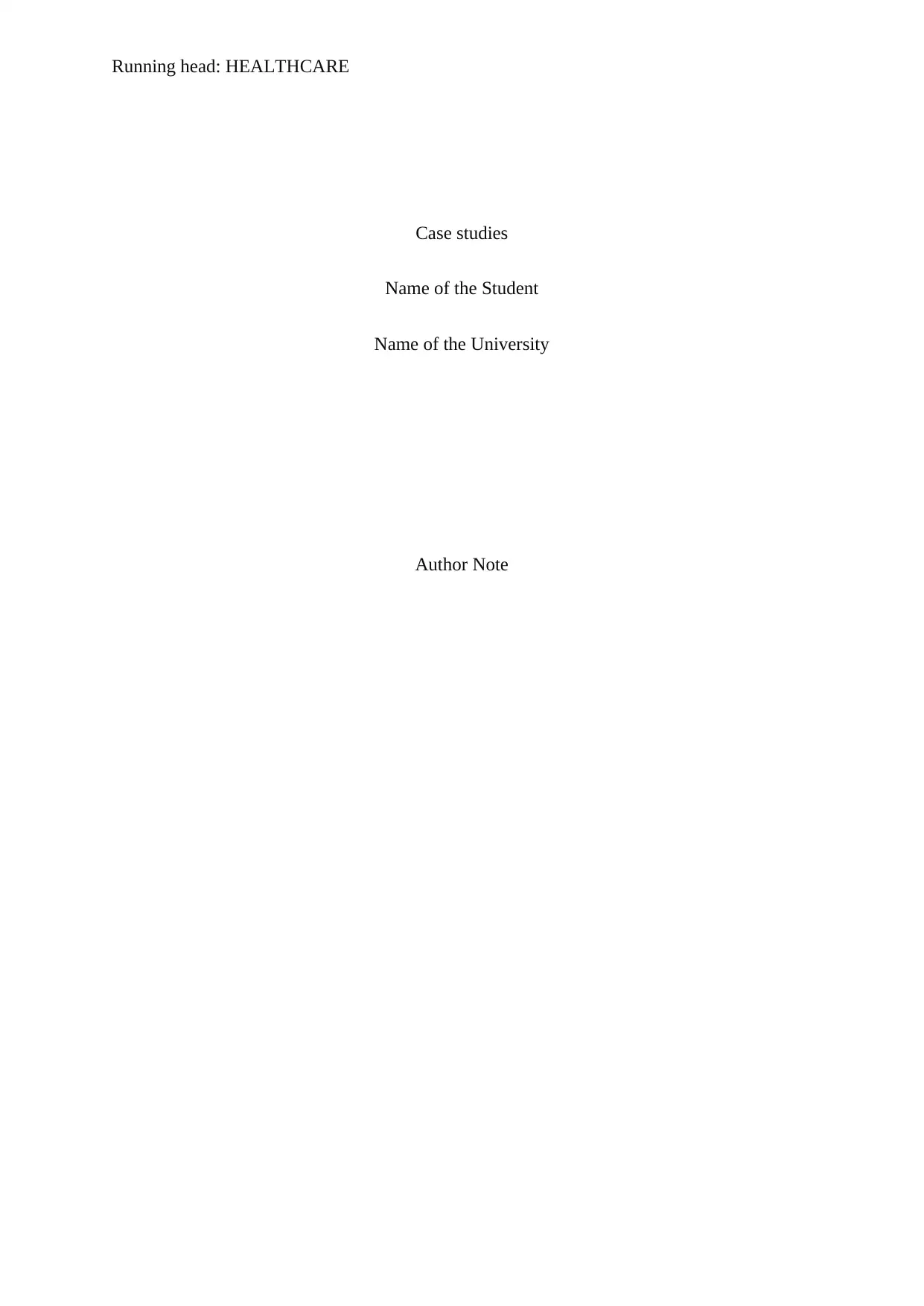
Running head: HEALTHCARE
Case studies
Name of the Student
Name of the University
Author Note
Case studies
Name of the Student
Name of the University
Author Note
Paraphrase This Document
Need a fresh take? Get an instant paraphrase of this document with our AI Paraphraser
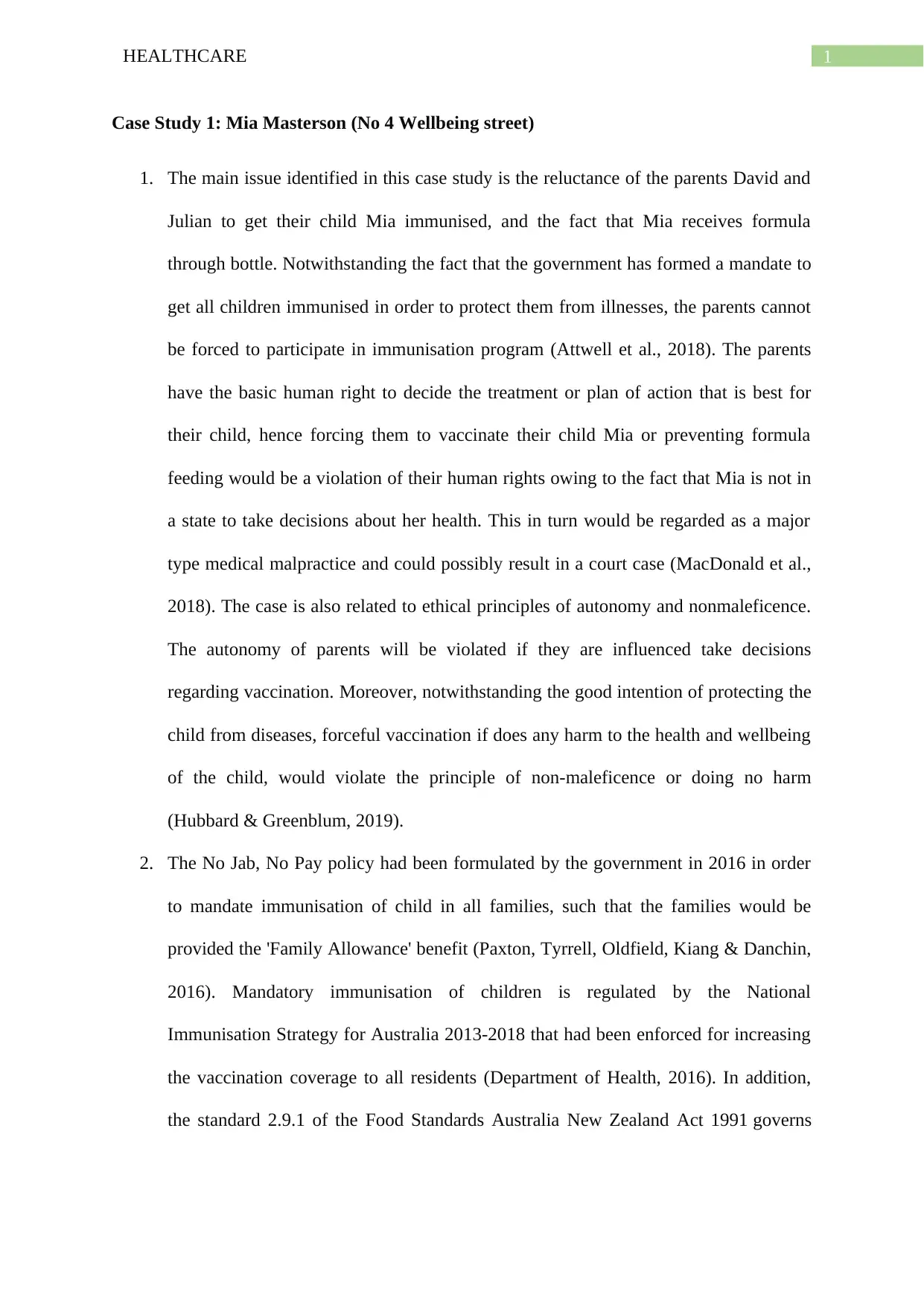
1HEALTHCARE
Case Study 1: Mia Masterson (No 4 Wellbeing street)
1. The main issue identified in this case study is the reluctance of the parents David and
Julian to get their child Mia immunised, and the fact that Mia receives formula
through bottle. Notwithstanding the fact that the government has formed a mandate to
get all children immunised in order to protect them from illnesses, the parents cannot
be forced to participate in immunisation program (Attwell et al., 2018). The parents
have the basic human right to decide the treatment or plan of action that is best for
their child, hence forcing them to vaccinate their child Mia or preventing formula
feeding would be a violation of their human rights owing to the fact that Mia is not in
a state to take decisions about her health. This in turn would be regarded as a major
type medical malpractice and could possibly result in a court case (MacDonald et al.,
2018). The case is also related to ethical principles of autonomy and nonmaleficence.
The autonomy of parents will be violated if they are influenced take decisions
regarding vaccination. Moreover, notwithstanding the good intention of protecting the
child from diseases, forceful vaccination if does any harm to the health and wellbeing
of the child, would violate the principle of non-maleficence or doing no harm
(Hubbard & Greenblum, 2019).
2. The No Jab, No Pay policy had been formulated by the government in 2016 in order
to mandate immunisation of child in all families, such that the families would be
provided the 'Family Allowance' benefit (Paxton, Tyrrell, Oldfield, Kiang & Danchin,
2016). Mandatory immunisation of children is regulated by the National
Immunisation Strategy for Australia 2013-2018 that had been enforced for increasing
the vaccination coverage to all residents (Department of Health, 2016). In addition,
the standard 2.9.1 of the Food Standards Australia New Zealand Act 1991 governs
Case Study 1: Mia Masterson (No 4 Wellbeing street)
1. The main issue identified in this case study is the reluctance of the parents David and
Julian to get their child Mia immunised, and the fact that Mia receives formula
through bottle. Notwithstanding the fact that the government has formed a mandate to
get all children immunised in order to protect them from illnesses, the parents cannot
be forced to participate in immunisation program (Attwell et al., 2018). The parents
have the basic human right to decide the treatment or plan of action that is best for
their child, hence forcing them to vaccinate their child Mia or preventing formula
feeding would be a violation of their human rights owing to the fact that Mia is not in
a state to take decisions about her health. This in turn would be regarded as a major
type medical malpractice and could possibly result in a court case (MacDonald et al.,
2018). The case is also related to ethical principles of autonomy and nonmaleficence.
The autonomy of parents will be violated if they are influenced take decisions
regarding vaccination. Moreover, notwithstanding the good intention of protecting the
child from diseases, forceful vaccination if does any harm to the health and wellbeing
of the child, would violate the principle of non-maleficence or doing no harm
(Hubbard & Greenblum, 2019).
2. The No Jab, No Pay policy had been formulated by the government in 2016 in order
to mandate immunisation of child in all families, such that the families would be
provided the 'Family Allowance' benefit (Paxton, Tyrrell, Oldfield, Kiang & Danchin,
2016). Mandatory immunisation of children is regulated by the National
Immunisation Strategy for Australia 2013-2018 that had been enforced for increasing
the vaccination coverage to all residents (Department of Health, 2016). In addition,
the standard 2.9.1 of the Food Standards Australia New Zealand Act 1991 governs
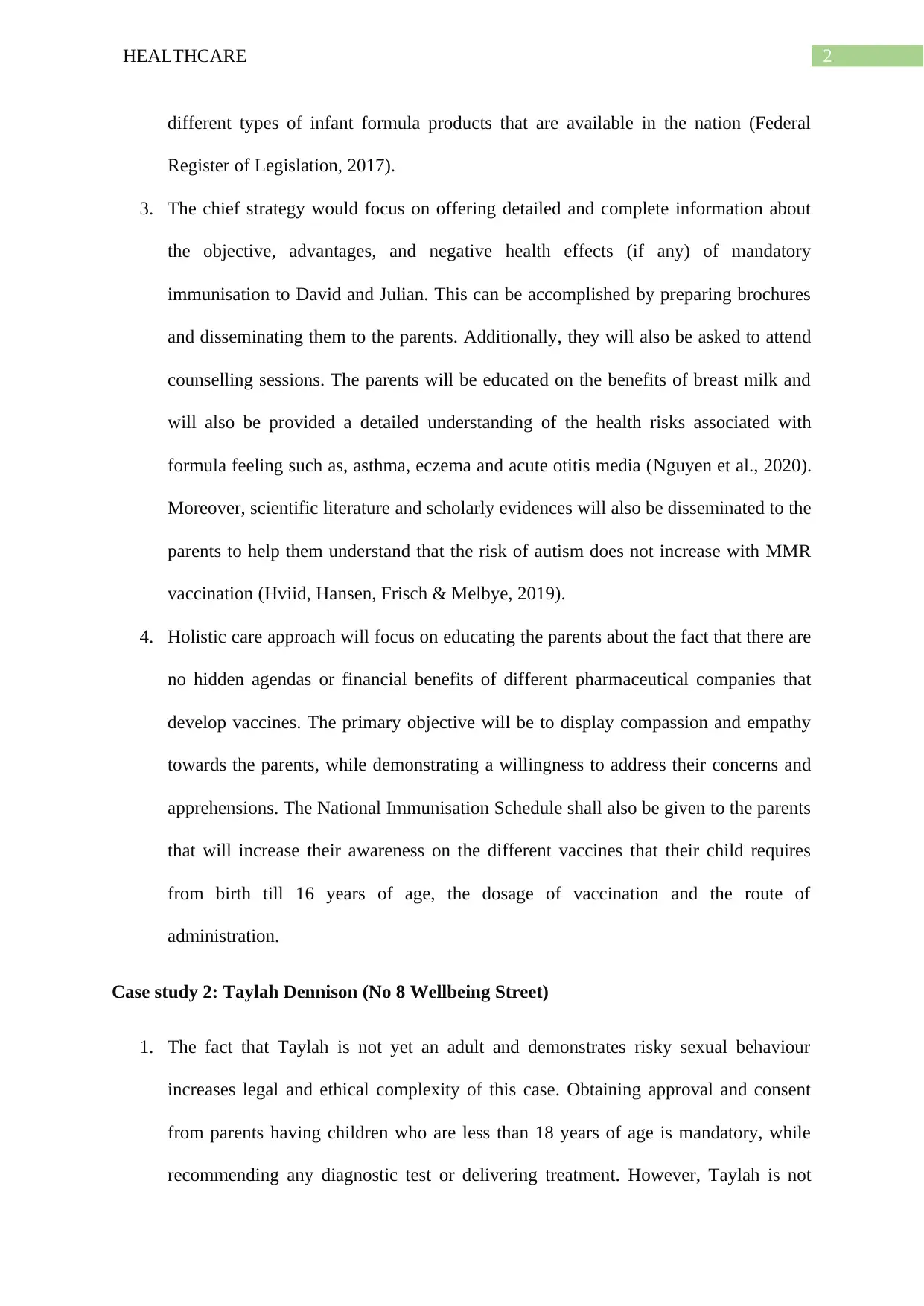
2HEALTHCARE
different types of infant formula products that are available in the nation (Federal
Register of Legislation, 2017).
3. The chief strategy would focus on offering detailed and complete information about
the objective, advantages, and negative health effects (if any) of mandatory
immunisation to David and Julian. This can be accomplished by preparing brochures
and disseminating them to the parents. Additionally, they will also be asked to attend
counselling sessions. The parents will be educated on the benefits of breast milk and
will also be provided a detailed understanding of the health risks associated with
formula feeling such as, asthma, eczema and acute otitis media (Nguyen et al., 2020).
Moreover, scientific literature and scholarly evidences will also be disseminated to the
parents to help them understand that the risk of autism does not increase with MMR
vaccination (Hviid, Hansen, Frisch & Melbye, 2019).
4. Holistic care approach will focus on educating the parents about the fact that there are
no hidden agendas or financial benefits of different pharmaceutical companies that
develop vaccines. The primary objective will be to display compassion and empathy
towards the parents, while demonstrating a willingness to address their concerns and
apprehensions. The National Immunisation Schedule shall also be given to the parents
that will increase their awareness on the different vaccines that their child requires
from birth till 16 years of age, the dosage of vaccination and the route of
administration.
Case study 2: Taylah Dennison (No 8 Wellbeing Street)
1. The fact that Taylah is not yet an adult and demonstrates risky sexual behaviour
increases legal and ethical complexity of this case. Obtaining approval and consent
from parents having children who are less than 18 years of age is mandatory, while
recommending any diagnostic test or delivering treatment. However, Taylah is not
different types of infant formula products that are available in the nation (Federal
Register of Legislation, 2017).
3. The chief strategy would focus on offering detailed and complete information about
the objective, advantages, and negative health effects (if any) of mandatory
immunisation to David and Julian. This can be accomplished by preparing brochures
and disseminating them to the parents. Additionally, they will also be asked to attend
counselling sessions. The parents will be educated on the benefits of breast milk and
will also be provided a detailed understanding of the health risks associated with
formula feeling such as, asthma, eczema and acute otitis media (Nguyen et al., 2020).
Moreover, scientific literature and scholarly evidences will also be disseminated to the
parents to help them understand that the risk of autism does not increase with MMR
vaccination (Hviid, Hansen, Frisch & Melbye, 2019).
4. Holistic care approach will focus on educating the parents about the fact that there are
no hidden agendas or financial benefits of different pharmaceutical companies that
develop vaccines. The primary objective will be to display compassion and empathy
towards the parents, while demonstrating a willingness to address their concerns and
apprehensions. The National Immunisation Schedule shall also be given to the parents
that will increase their awareness on the different vaccines that their child requires
from birth till 16 years of age, the dosage of vaccination and the route of
administration.
Case study 2: Taylah Dennison (No 8 Wellbeing Street)
1. The fact that Taylah is not yet an adult and demonstrates risky sexual behaviour
increases legal and ethical complexity of this case. Obtaining approval and consent
from parents having children who are less than 18 years of age is mandatory, while
recommending any diagnostic test or delivering treatment. However, Taylah is not
⊘ This is a preview!⊘
Do you want full access?
Subscribe today to unlock all pages.

Trusted by 1+ million students worldwide
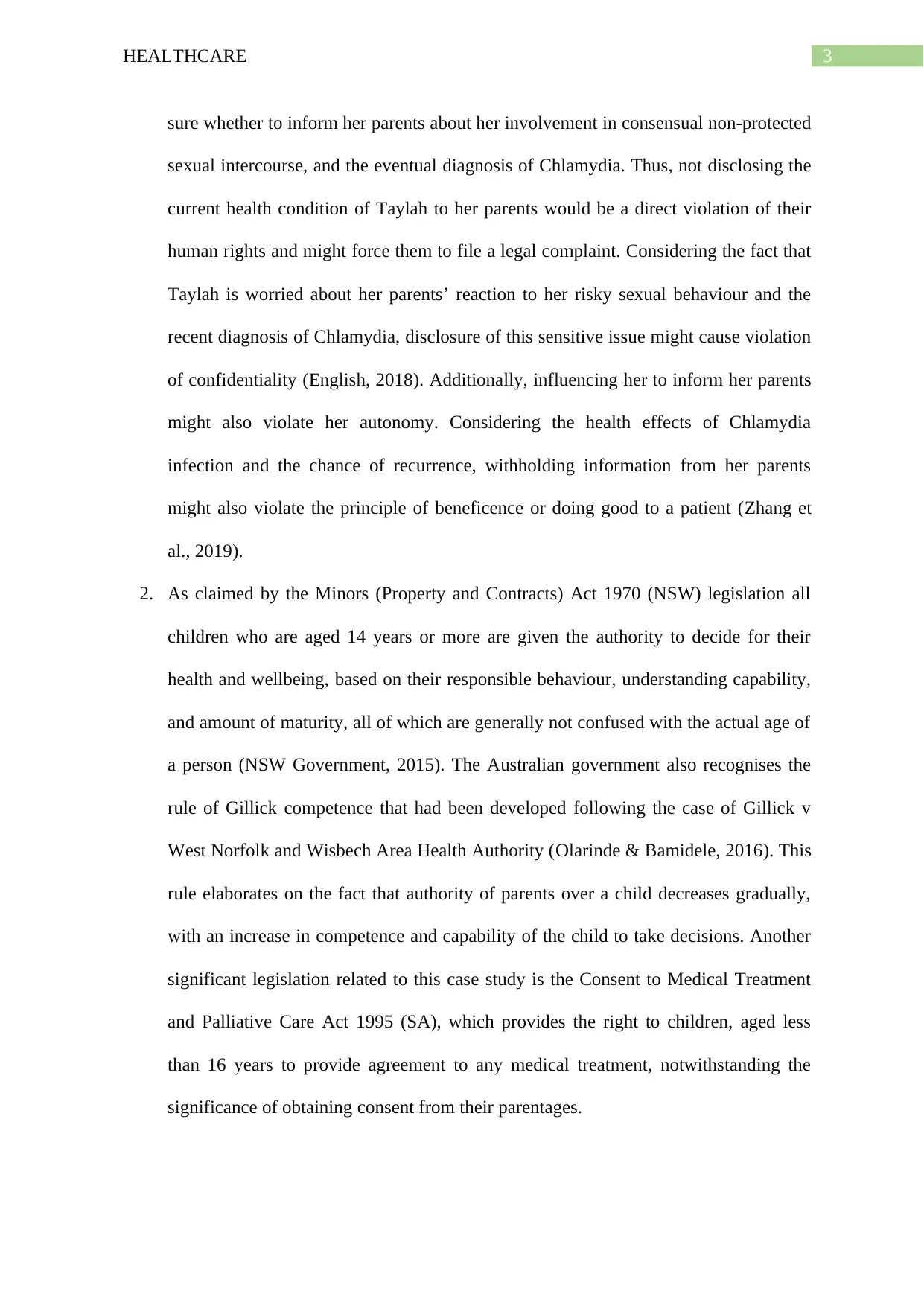
3HEALTHCARE
sure whether to inform her parents about her involvement in consensual non-protected
sexual intercourse, and the eventual diagnosis of Chlamydia. Thus, not disclosing the
current health condition of Taylah to her parents would be a direct violation of their
human rights and might force them to file a legal complaint. Considering the fact that
Taylah is worried about her parents’ reaction to her risky sexual behaviour and the
recent diagnosis of Chlamydia, disclosure of this sensitive issue might cause violation
of confidentiality (English, 2018). Additionally, influencing her to inform her parents
might also violate her autonomy. Considering the health effects of Chlamydia
infection and the chance of recurrence, withholding information from her parents
might also violate the principle of beneficence or doing good to a patient (Zhang et
al., 2019).
2. As claimed by the Minors (Property and Contracts) Act 1970 (NSW) legislation all
children who are aged 14 years or more are given the authority to decide for their
health and wellbeing, based on their responsible behaviour, understanding capability,
and amount of maturity, all of which are generally not confused with the actual age of
a person (NSW Government, 2015). The Australian government also recognises the
rule of Gillick competence that had been developed following the case of Gillick v
West Norfolk and Wisbech Area Health Authority (Olarinde & Bamidele, 2016). This
rule elaborates on the fact that authority of parents over a child decreases gradually,
with an increase in competence and capability of the child to take decisions. Another
significant legislation related to this case study is the Consent to Medical Treatment
and Palliative Care Act 1995 (SA), which provides the right to children, aged less
than 16 years to provide agreement to any medical treatment, notwithstanding the
significance of obtaining consent from their parentages.
sure whether to inform her parents about her involvement in consensual non-protected
sexual intercourse, and the eventual diagnosis of Chlamydia. Thus, not disclosing the
current health condition of Taylah to her parents would be a direct violation of their
human rights and might force them to file a legal complaint. Considering the fact that
Taylah is worried about her parents’ reaction to her risky sexual behaviour and the
recent diagnosis of Chlamydia, disclosure of this sensitive issue might cause violation
of confidentiality (English, 2018). Additionally, influencing her to inform her parents
might also violate her autonomy. Considering the health effects of Chlamydia
infection and the chance of recurrence, withholding information from her parents
might also violate the principle of beneficence or doing good to a patient (Zhang et
al., 2019).
2. As claimed by the Minors (Property and Contracts) Act 1970 (NSW) legislation all
children who are aged 14 years or more are given the authority to decide for their
health and wellbeing, based on their responsible behaviour, understanding capability,
and amount of maturity, all of which are generally not confused with the actual age of
a person (NSW Government, 2015). The Australian government also recognises the
rule of Gillick competence that had been developed following the case of Gillick v
West Norfolk and Wisbech Area Health Authority (Olarinde & Bamidele, 2016). This
rule elaborates on the fact that authority of parents over a child decreases gradually,
with an increase in competence and capability of the child to take decisions. Another
significant legislation related to this case study is the Consent to Medical Treatment
and Palliative Care Act 1995 (SA), which provides the right to children, aged less
than 16 years to provide agreement to any medical treatment, notwithstanding the
significance of obtaining consent from their parentages.
Paraphrase This Document
Need a fresh take? Get an instant paraphrase of this document with our AI Paraphraser
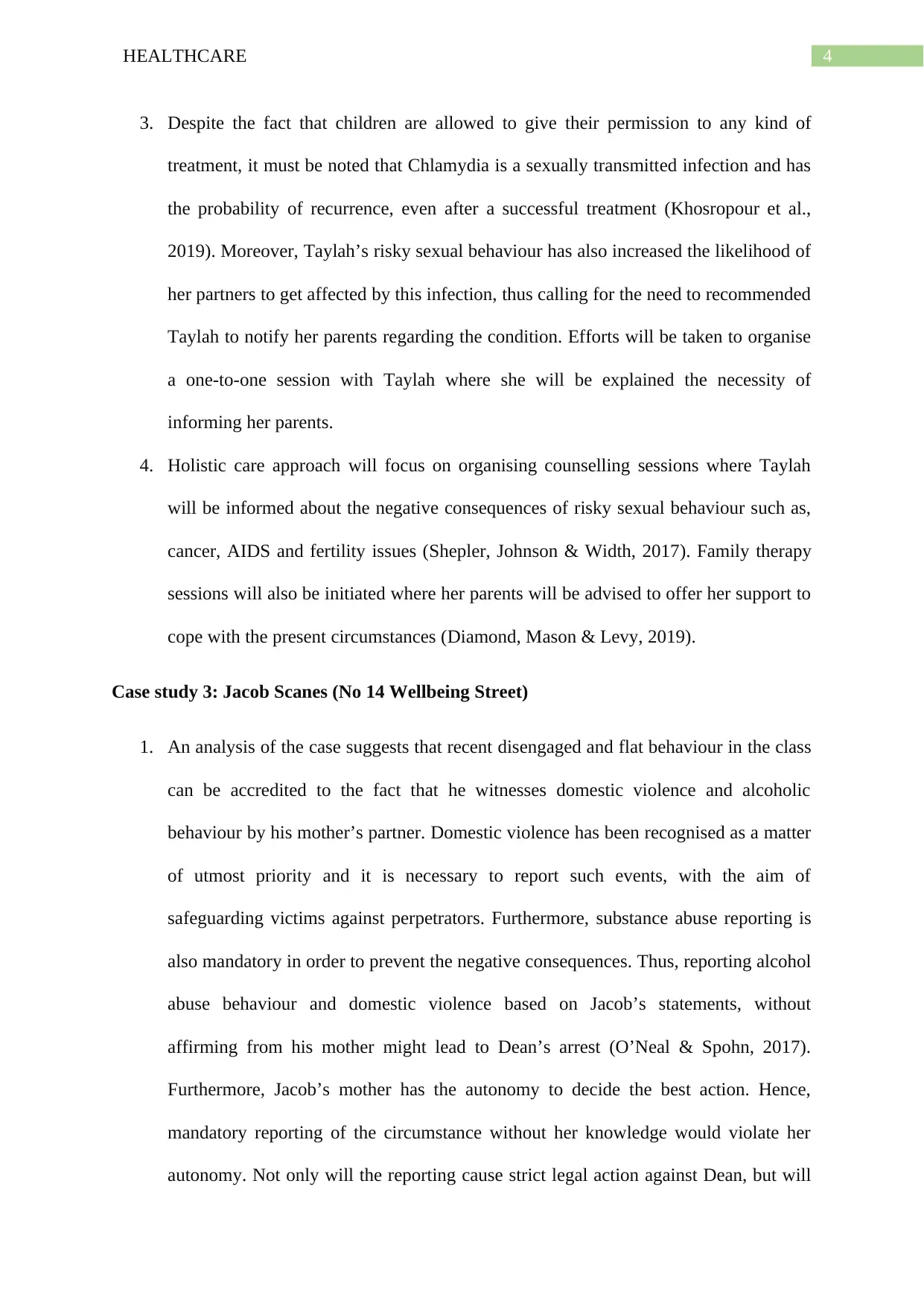
4HEALTHCARE
3. Despite the fact that children are allowed to give their permission to any kind of
treatment, it must be noted that Chlamydia is a sexually transmitted infection and has
the probability of recurrence, even after a successful treatment (Khosropour et al.,
2019). Moreover, Taylah’s risky sexual behaviour has also increased the likelihood of
her partners to get affected by this infection, thus calling for the need to recommended
Taylah to notify her parents regarding the condition. Efforts will be taken to organise
a one-to-one session with Taylah where she will be explained the necessity of
informing her parents.
4. Holistic care approach will focus on organising counselling sessions where Taylah
will be informed about the negative consequences of risky sexual behaviour such as,
cancer, AIDS and fertility issues (Shepler, Johnson & Width, 2017). Family therapy
sessions will also be initiated where her parents will be advised to offer her support to
cope with the present circumstances (Diamond, Mason & Levy, 2019).
Case study 3: Jacob Scanes (No 14 Wellbeing Street)
1. An analysis of the case suggests that recent disengaged and flat behaviour in the class
can be accredited to the fact that he witnesses domestic violence and alcoholic
behaviour by his mother’s partner. Domestic violence has been recognised as a matter
of utmost priority and it is necessary to report such events, with the aim of
safeguarding victims against perpetrators. Furthermore, substance abuse reporting is
also mandatory in order to prevent the negative consequences. Thus, reporting alcohol
abuse behaviour and domestic violence based on Jacob’s statements, without
affirming from his mother might lead to Dean’s arrest (O’Neal & Spohn, 2017).
Furthermore, Jacob’s mother has the autonomy to decide the best action. Hence,
mandatory reporting of the circumstance without her knowledge would violate her
autonomy. Not only will the reporting cause strict legal action against Dean, but will
3. Despite the fact that children are allowed to give their permission to any kind of
treatment, it must be noted that Chlamydia is a sexually transmitted infection and has
the probability of recurrence, even after a successful treatment (Khosropour et al.,
2019). Moreover, Taylah’s risky sexual behaviour has also increased the likelihood of
her partners to get affected by this infection, thus calling for the need to recommended
Taylah to notify her parents regarding the condition. Efforts will be taken to organise
a one-to-one session with Taylah where she will be explained the necessity of
informing her parents.
4. Holistic care approach will focus on organising counselling sessions where Taylah
will be informed about the negative consequences of risky sexual behaviour such as,
cancer, AIDS and fertility issues (Shepler, Johnson & Width, 2017). Family therapy
sessions will also be initiated where her parents will be advised to offer her support to
cope with the present circumstances (Diamond, Mason & Levy, 2019).
Case study 3: Jacob Scanes (No 14 Wellbeing Street)
1. An analysis of the case suggests that recent disengaged and flat behaviour in the class
can be accredited to the fact that he witnesses domestic violence and alcoholic
behaviour by his mother’s partner. Domestic violence has been recognised as a matter
of utmost priority and it is necessary to report such events, with the aim of
safeguarding victims against perpetrators. Furthermore, substance abuse reporting is
also mandatory in order to prevent the negative consequences. Thus, reporting alcohol
abuse behaviour and domestic violence based on Jacob’s statements, without
affirming from his mother might lead to Dean’s arrest (O’Neal & Spohn, 2017).
Furthermore, Jacob’s mother has the autonomy to decide the best action. Hence,
mandatory reporting of the circumstance without her knowledge would violate her
autonomy. Not only will the reporting cause strict legal action against Dean, but will
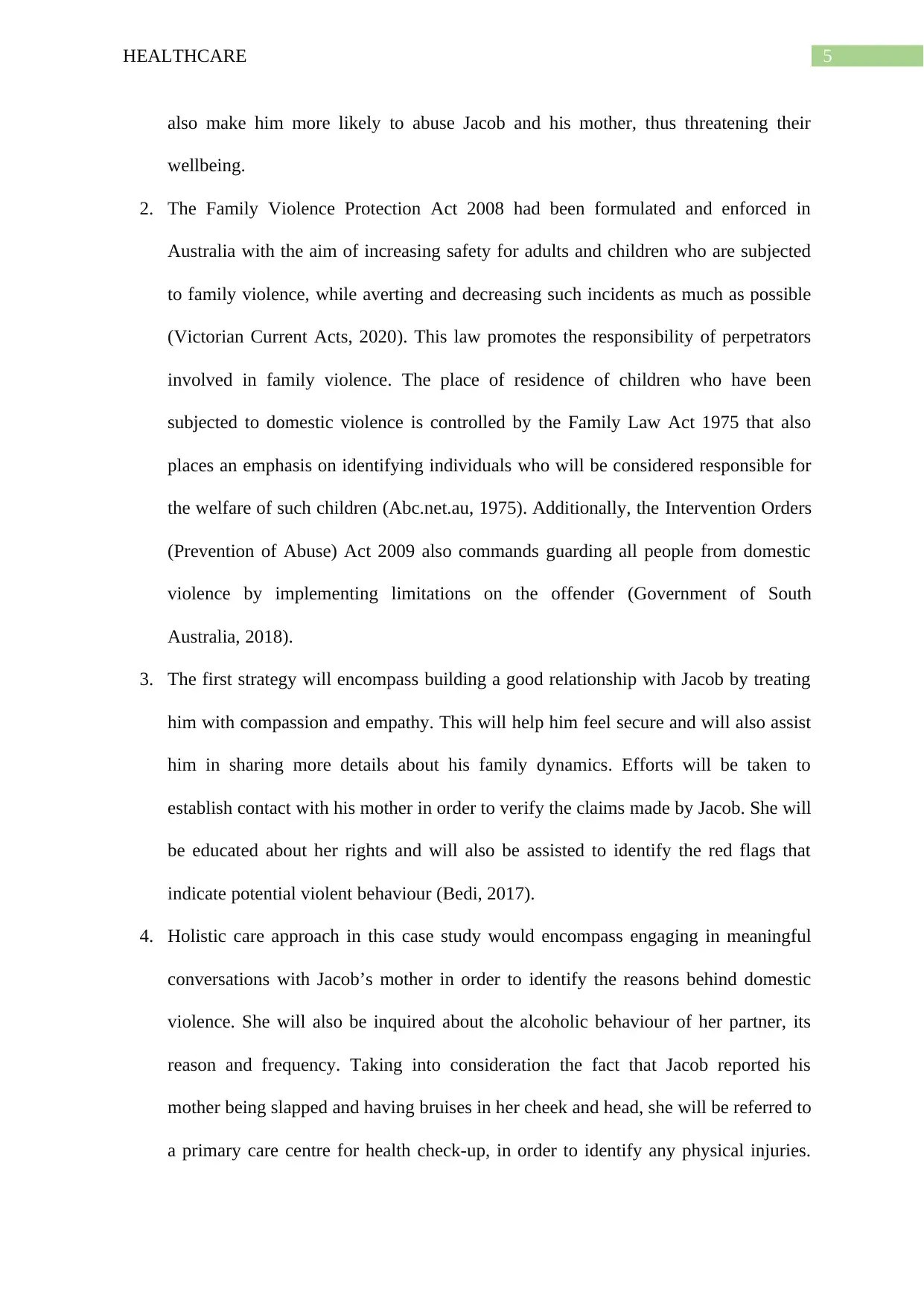
5HEALTHCARE
also make him more likely to abuse Jacob and his mother, thus threatening their
wellbeing.
2. The Family Violence Protection Act 2008 had been formulated and enforced in
Australia with the aim of increasing safety for adults and children who are subjected
to family violence, while averting and decreasing such incidents as much as possible
(Victorian Current Acts, 2020). This law promotes the responsibility of perpetrators
involved in family violence. The place of residence of children who have been
subjected to domestic violence is controlled by the Family Law Act 1975 that also
places an emphasis on identifying individuals who will be considered responsible for
the welfare of such children (Abc.net.au, 1975). Additionally, the Intervention Orders
(Prevention of Abuse) Act 2009 also commands guarding all people from domestic
violence by implementing limitations on the offender (Government of South
Australia, 2018).
3. The first strategy will encompass building a good relationship with Jacob by treating
him with compassion and empathy. This will help him feel secure and will also assist
him in sharing more details about his family dynamics. Efforts will be taken to
establish contact with his mother in order to verify the claims made by Jacob. She will
be educated about her rights and will also be assisted to identify the red flags that
indicate potential violent behaviour (Bedi, 2017).
4. Holistic care approach in this case study would encompass engaging in meaningful
conversations with Jacob’s mother in order to identify the reasons behind domestic
violence. She will also be inquired about the alcoholic behaviour of her partner, its
reason and frequency. Taking into consideration the fact that Jacob reported his
mother being slapped and having bruises in her cheek and head, she will be referred to
a primary care centre for health check-up, in order to identify any physical injuries.
also make him more likely to abuse Jacob and his mother, thus threatening their
wellbeing.
2. The Family Violence Protection Act 2008 had been formulated and enforced in
Australia with the aim of increasing safety for adults and children who are subjected
to family violence, while averting and decreasing such incidents as much as possible
(Victorian Current Acts, 2020). This law promotes the responsibility of perpetrators
involved in family violence. The place of residence of children who have been
subjected to domestic violence is controlled by the Family Law Act 1975 that also
places an emphasis on identifying individuals who will be considered responsible for
the welfare of such children (Abc.net.au, 1975). Additionally, the Intervention Orders
(Prevention of Abuse) Act 2009 also commands guarding all people from domestic
violence by implementing limitations on the offender (Government of South
Australia, 2018).
3. The first strategy will encompass building a good relationship with Jacob by treating
him with compassion and empathy. This will help him feel secure and will also assist
him in sharing more details about his family dynamics. Efforts will be taken to
establish contact with his mother in order to verify the claims made by Jacob. She will
be educated about her rights and will also be assisted to identify the red flags that
indicate potential violent behaviour (Bedi, 2017).
4. Holistic care approach in this case study would encompass engaging in meaningful
conversations with Jacob’s mother in order to identify the reasons behind domestic
violence. She will also be inquired about the alcoholic behaviour of her partner, its
reason and frequency. Taking into consideration the fact that Jacob reported his
mother being slapped and having bruises in her cheek and head, she will be referred to
a primary care centre for health check-up, in order to identify any physical injuries.
⊘ This is a preview!⊘
Do you want full access?
Subscribe today to unlock all pages.

Trusted by 1+ million students worldwide
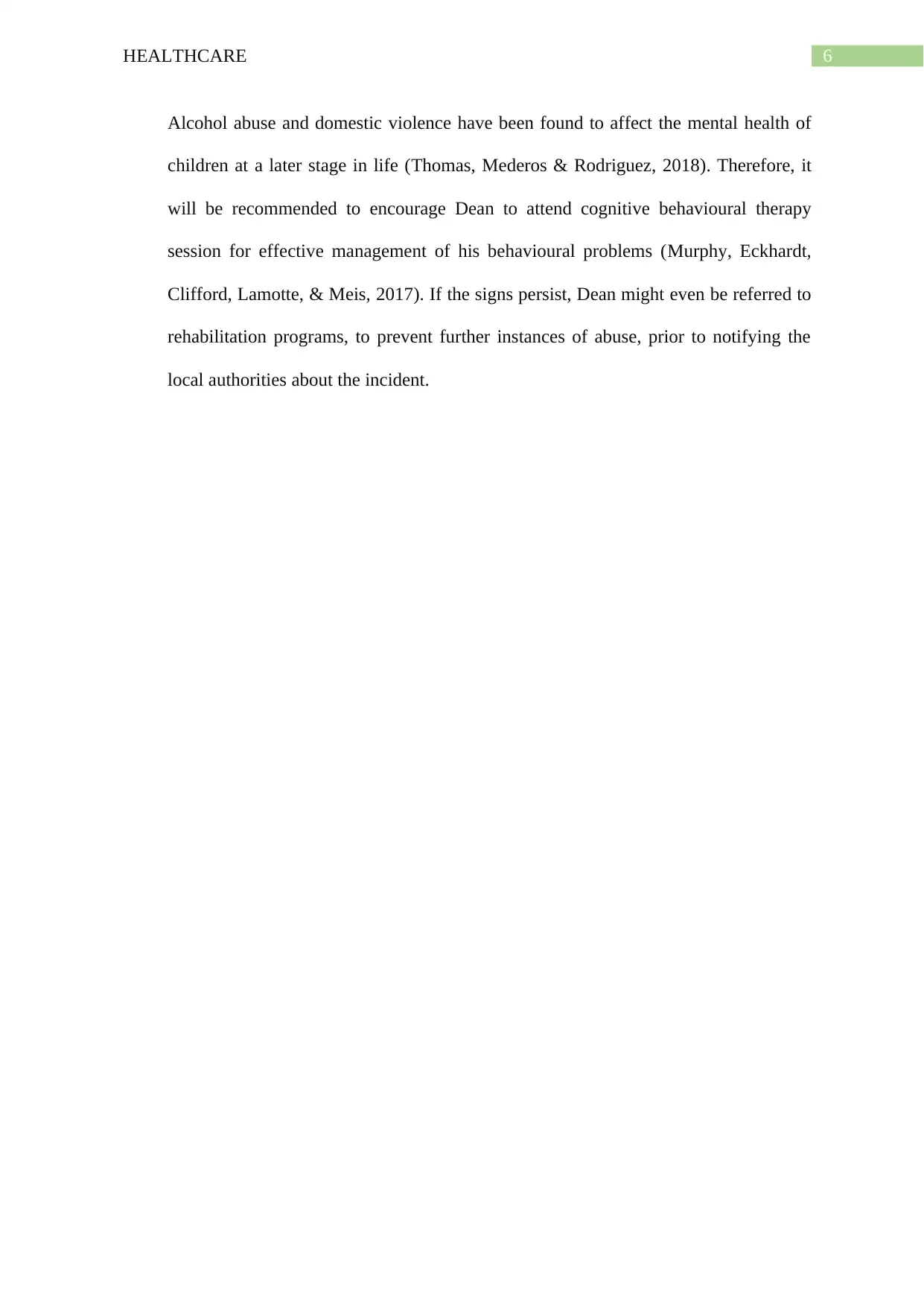
6HEALTHCARE
Alcohol abuse and domestic violence have been found to affect the mental health of
children at a later stage in life (Thomas, Mederos & Rodriguez, 2018). Therefore, it
will be recommended to encourage Dean to attend cognitive behavioural therapy
session for effective management of his behavioural problems (Murphy, Eckhardt,
Clifford, Lamotte, & Meis, 2017). If the signs persist, Dean might even be referred to
rehabilitation programs, to prevent further instances of abuse, prior to notifying the
local authorities about the incident.
Alcohol abuse and domestic violence have been found to affect the mental health of
children at a later stage in life (Thomas, Mederos & Rodriguez, 2018). Therefore, it
will be recommended to encourage Dean to attend cognitive behavioural therapy
session for effective management of his behavioural problems (Murphy, Eckhardt,
Clifford, Lamotte, & Meis, 2017). If the signs persist, Dean might even be referred to
rehabilitation programs, to prevent further instances of abuse, prior to notifying the
local authorities about the incident.
Paraphrase This Document
Need a fresh take? Get an instant paraphrase of this document with our AI Paraphraser
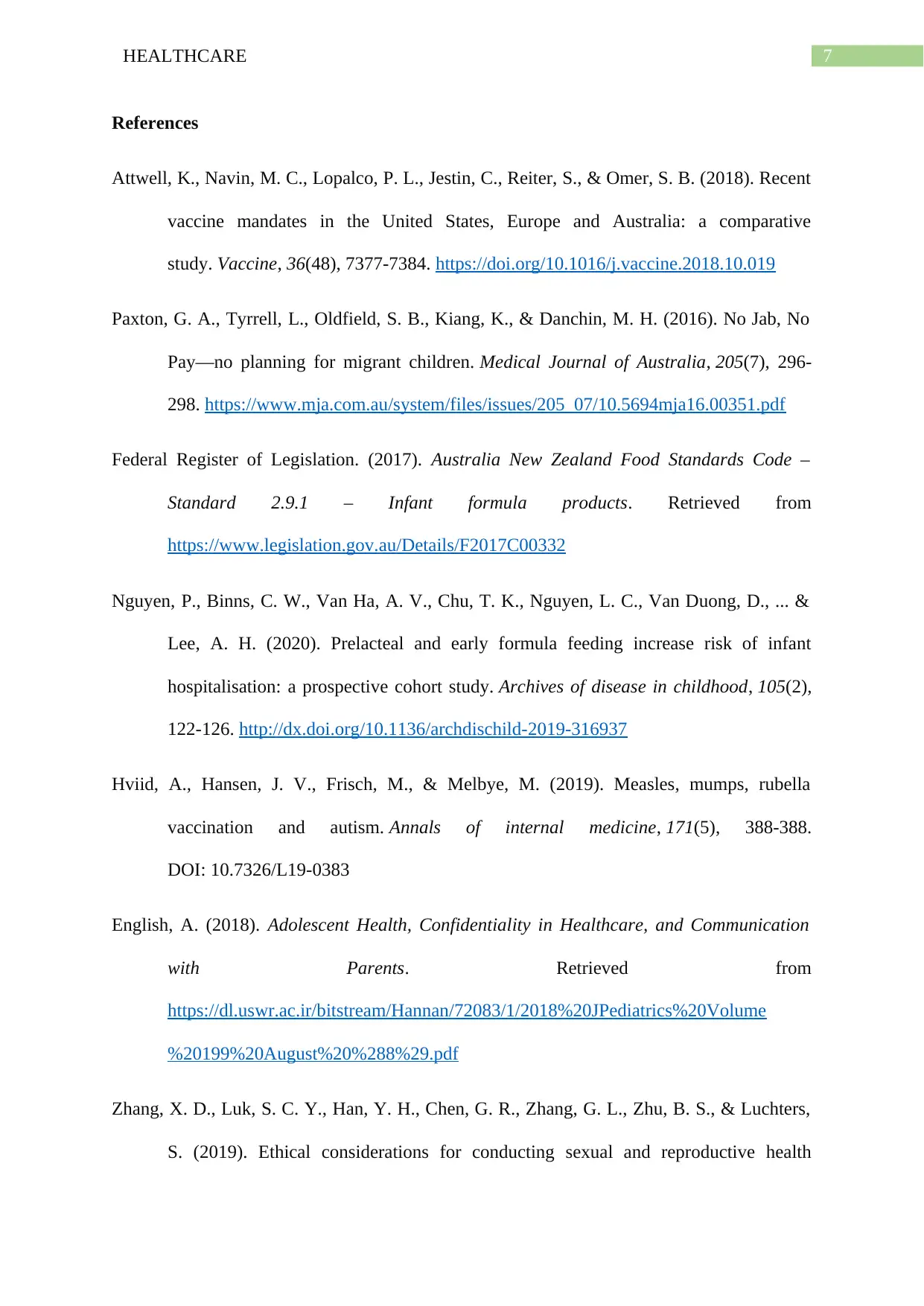
7HEALTHCARE
References
Attwell, K., Navin, M. C., Lopalco, P. L., Jestin, C., Reiter, S., & Omer, S. B. (2018). Recent
vaccine mandates in the United States, Europe and Australia: a comparative
study. Vaccine, 36(48), 7377-7384. https://doi.org/10.1016/j.vaccine.2018.10.019
Paxton, G. A., Tyrrell, L., Oldfield, S. B., Kiang, K., & Danchin, M. H. (2016). No Jab, No
Pay—no planning for migrant children. Medical Journal of Australia, 205(7), 296-
298. https://www.mja.com.au/system/files/issues/205_07/10.5694mja16.00351.pdf
Federal Register of Legislation. (2017). Australia New Zealand Food Standards Code –
Standard 2.9.1 – Infant formula products. Retrieved from
https://www.legislation.gov.au/Details/F2017C00332
Nguyen, P., Binns, C. W., Van Ha, A. V., Chu, T. K., Nguyen, L. C., Van Duong, D., ... &
Lee, A. H. (2020). Prelacteal and early formula feeding increase risk of infant
hospitalisation: a prospective cohort study. Archives of disease in childhood, 105(2),
122-126. http://dx.doi.org/10.1136/archdischild-2019-316937
Hviid, A., Hansen, J. V., Frisch, M., & Melbye, M. (2019). Measles, mumps, rubella
vaccination and autism. Annals of internal medicine, 171(5), 388-388.
DOI: 10.7326/L19-0383
English, A. (2018). Adolescent Health, Confidentiality in Healthcare, and Communication
with Parents. Retrieved from
https://dl.uswr.ac.ir/bitstream/Hannan/72083/1/2018%20JPediatrics%20Volume
%20199%20August%20%288%29.pdf
Zhang, X. D., Luk, S. C. Y., Han, Y. H., Chen, G. R., Zhang, G. L., Zhu, B. S., & Luchters,
S. (2019). Ethical considerations for conducting sexual and reproductive health
References
Attwell, K., Navin, M. C., Lopalco, P. L., Jestin, C., Reiter, S., & Omer, S. B. (2018). Recent
vaccine mandates in the United States, Europe and Australia: a comparative
study. Vaccine, 36(48), 7377-7384. https://doi.org/10.1016/j.vaccine.2018.10.019
Paxton, G. A., Tyrrell, L., Oldfield, S. B., Kiang, K., & Danchin, M. H. (2016). No Jab, No
Pay—no planning for migrant children. Medical Journal of Australia, 205(7), 296-
298. https://www.mja.com.au/system/files/issues/205_07/10.5694mja16.00351.pdf
Federal Register of Legislation. (2017). Australia New Zealand Food Standards Code –
Standard 2.9.1 – Infant formula products. Retrieved from
https://www.legislation.gov.au/Details/F2017C00332
Nguyen, P., Binns, C. W., Van Ha, A. V., Chu, T. K., Nguyen, L. C., Van Duong, D., ... &
Lee, A. H. (2020). Prelacteal and early formula feeding increase risk of infant
hospitalisation: a prospective cohort study. Archives of disease in childhood, 105(2),
122-126. http://dx.doi.org/10.1136/archdischild-2019-316937
Hviid, A., Hansen, J. V., Frisch, M., & Melbye, M. (2019). Measles, mumps, rubella
vaccination and autism. Annals of internal medicine, 171(5), 388-388.
DOI: 10.7326/L19-0383
English, A. (2018). Adolescent Health, Confidentiality in Healthcare, and Communication
with Parents. Retrieved from
https://dl.uswr.ac.ir/bitstream/Hannan/72083/1/2018%20JPediatrics%20Volume
%20199%20August%20%288%29.pdf
Zhang, X. D., Luk, S. C. Y., Han, Y. H., Chen, G. R., Zhang, G. L., Zhu, B. S., & Luchters,
S. (2019). Ethical considerations for conducting sexual and reproductive health
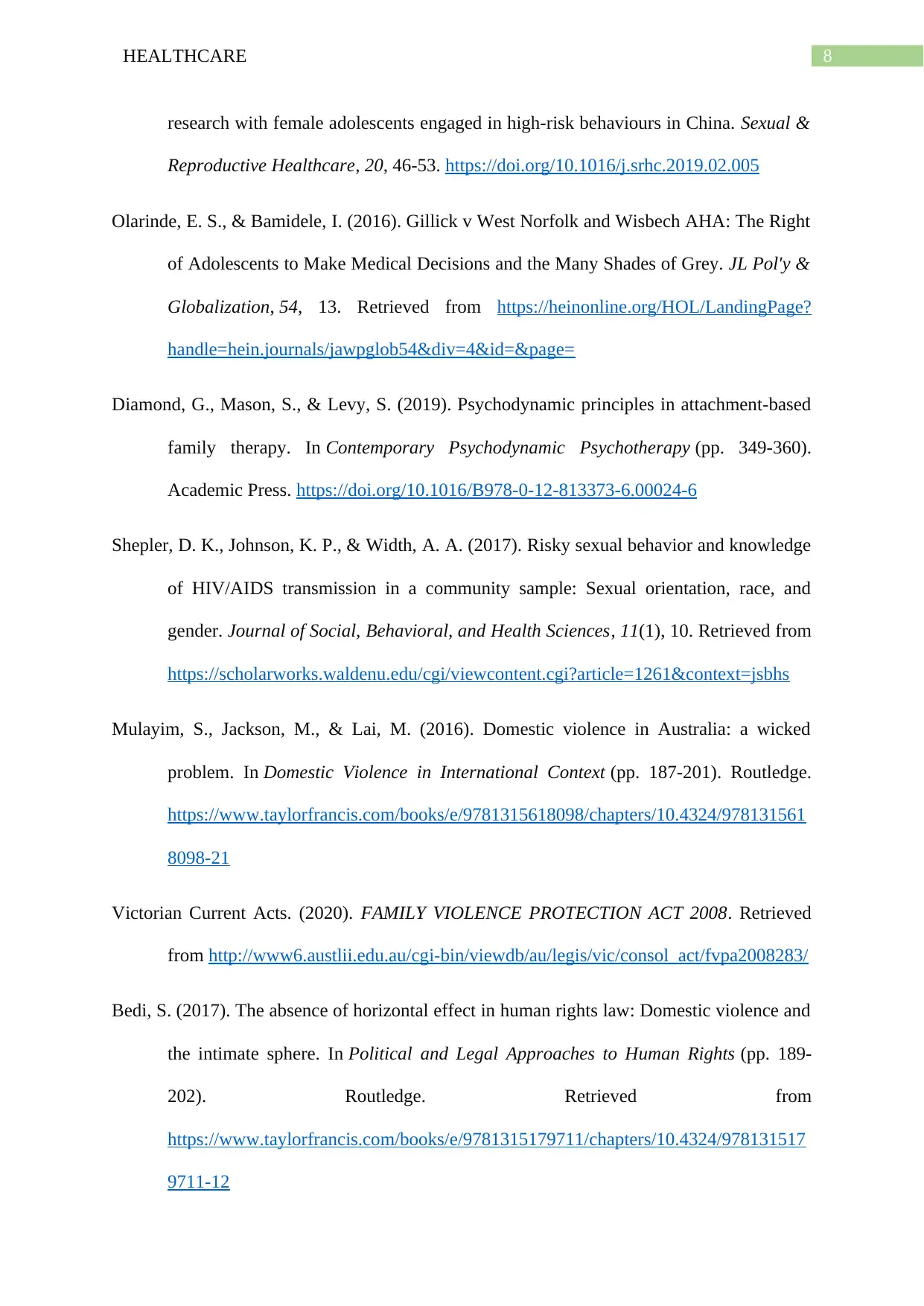
8HEALTHCARE
research with female adolescents engaged in high-risk behaviours in China. Sexual &
Reproductive Healthcare, 20, 46-53. https://doi.org/10.1016/j.srhc.2019.02.005
Olarinde, E. S., & Bamidele, I. (2016). Gillick v West Norfolk and Wisbech AHA: The Right
of Adolescents to Make Medical Decisions and the Many Shades of Grey. JL Pol'y &
Globalization, 54, 13. Retrieved from https://heinonline.org/HOL/LandingPage?
handle=hein.journals/jawpglob54&div=4&id=&page=
Diamond, G., Mason, S., & Levy, S. (2019). Psychodynamic principles in attachment-based
family therapy. In Contemporary Psychodynamic Psychotherapy (pp. 349-360).
Academic Press. https://doi.org/10.1016/B978-0-12-813373-6.00024-6
Shepler, D. K., Johnson, K. P., & Width, A. A. (2017). Risky sexual behavior and knowledge
of HIV/AIDS transmission in a community sample: Sexual orientation, race, and
gender. Journal of Social, Behavioral, and Health Sciences, 11(1), 10. Retrieved from
https://scholarworks.waldenu.edu/cgi/viewcontent.cgi?article=1261&context=jsbhs
Mulayim, S., Jackson, M., & Lai, M. (2016). Domestic violence in Australia: a wicked
problem. In Domestic Violence in International Context (pp. 187-201). Routledge.
https://www.taylorfrancis.com/books/e/9781315618098/chapters/10.4324/978131561
8098-21
Victorian Current Acts. (2020). FAMILY VIOLENCE PROTECTION ACT 2008. Retrieved
from http://www6.austlii.edu.au/cgi-bin/viewdb/au/legis/vic/consol_act/fvpa2008283/
Bedi, S. (2017). The absence of horizontal effect in human rights law: Domestic violence and
the intimate sphere. In Political and Legal Approaches to Human Rights (pp. 189-
202). Routledge. Retrieved from
https://www.taylorfrancis.com/books/e/9781315179711/chapters/10.4324/978131517
9711-12
research with female adolescents engaged in high-risk behaviours in China. Sexual &
Reproductive Healthcare, 20, 46-53. https://doi.org/10.1016/j.srhc.2019.02.005
Olarinde, E. S., & Bamidele, I. (2016). Gillick v West Norfolk and Wisbech AHA: The Right
of Adolescents to Make Medical Decisions and the Many Shades of Grey. JL Pol'y &
Globalization, 54, 13. Retrieved from https://heinonline.org/HOL/LandingPage?
handle=hein.journals/jawpglob54&div=4&id=&page=
Diamond, G., Mason, S., & Levy, S. (2019). Psychodynamic principles in attachment-based
family therapy. In Contemporary Psychodynamic Psychotherapy (pp. 349-360).
Academic Press. https://doi.org/10.1016/B978-0-12-813373-6.00024-6
Shepler, D. K., Johnson, K. P., & Width, A. A. (2017). Risky sexual behavior and knowledge
of HIV/AIDS transmission in a community sample: Sexual orientation, race, and
gender. Journal of Social, Behavioral, and Health Sciences, 11(1), 10. Retrieved from
https://scholarworks.waldenu.edu/cgi/viewcontent.cgi?article=1261&context=jsbhs
Mulayim, S., Jackson, M., & Lai, M. (2016). Domestic violence in Australia: a wicked
problem. In Domestic Violence in International Context (pp. 187-201). Routledge.
https://www.taylorfrancis.com/books/e/9781315618098/chapters/10.4324/978131561
8098-21
Victorian Current Acts. (2020). FAMILY VIOLENCE PROTECTION ACT 2008. Retrieved
from http://www6.austlii.edu.au/cgi-bin/viewdb/au/legis/vic/consol_act/fvpa2008283/
Bedi, S. (2017). The absence of horizontal effect in human rights law: Domestic violence and
the intimate sphere. In Political and Legal Approaches to Human Rights (pp. 189-
202). Routledge. Retrieved from
https://www.taylorfrancis.com/books/e/9781315179711/chapters/10.4324/978131517
9711-12
⊘ This is a preview!⊘
Do you want full access?
Subscribe today to unlock all pages.

Trusted by 1+ million students worldwide
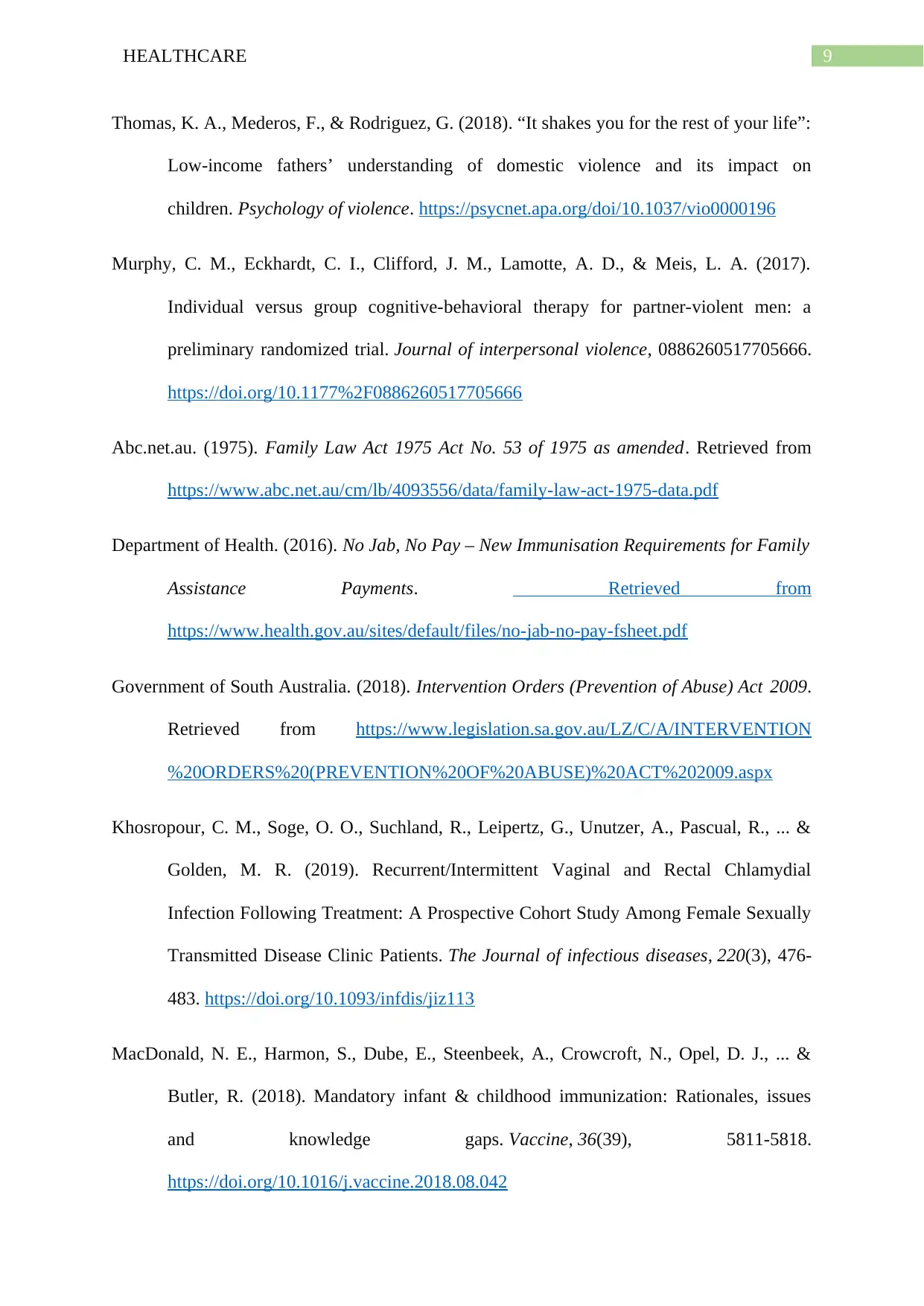
9HEALTHCARE
Thomas, K. A., Mederos, F., & Rodriguez, G. (2018). “It shakes you for the rest of your life”:
Low-income fathers’ understanding of domestic violence and its impact on
children. Psychology of violence. https://psycnet.apa.org/doi/10.1037/vio0000196
Murphy, C. M., Eckhardt, C. I., Clifford, J. M., Lamotte, A. D., & Meis, L. A. (2017).
Individual versus group cognitive-behavioral therapy for partner-violent men: a
preliminary randomized trial. Journal of interpersonal violence, 0886260517705666.
https://doi.org/10.1177%2F0886260517705666
Abc.net.au. (1975). Family Law Act 1975 Act No. 53 of 1975 as amended. Retrieved from
https://www.abc.net.au/cm/lb/4093556/data/family-law-act-1975-data.pdf
Department of Health. (2016). No Jab, No Pay – New Immunisation Requirements for Family
Assistance Payments. Retrieved from
https://www.health.gov.au/sites/default/files/no-jab-no-pay-fsheet.pdf
Government of South Australia. (2018). Intervention Orders (Prevention of Abuse) Act 2009.
Retrieved from https://www.legislation.sa.gov.au/LZ/C/A/INTERVENTION
%20ORDERS%20(PREVENTION%20OF%20ABUSE)%20ACT%202009.aspx
Khosropour, C. M., Soge, O. O., Suchland, R., Leipertz, G., Unutzer, A., Pascual, R., ... &
Golden, M. R. (2019). Recurrent/Intermittent Vaginal and Rectal Chlamydial
Infection Following Treatment: A Prospective Cohort Study Among Female Sexually
Transmitted Disease Clinic Patients. The Journal of infectious diseases, 220(3), 476-
483. https://doi.org/10.1093/infdis/jiz113
MacDonald, N. E., Harmon, S., Dube, E., Steenbeek, A., Crowcroft, N., Opel, D. J., ... &
Butler, R. (2018). Mandatory infant & childhood immunization: Rationales, issues
and knowledge gaps. Vaccine, 36(39), 5811-5818.
https://doi.org/10.1016/j.vaccine.2018.08.042
Thomas, K. A., Mederos, F., & Rodriguez, G. (2018). “It shakes you for the rest of your life”:
Low-income fathers’ understanding of domestic violence and its impact on
children. Psychology of violence. https://psycnet.apa.org/doi/10.1037/vio0000196
Murphy, C. M., Eckhardt, C. I., Clifford, J. M., Lamotte, A. D., & Meis, L. A. (2017).
Individual versus group cognitive-behavioral therapy for partner-violent men: a
preliminary randomized trial. Journal of interpersonal violence, 0886260517705666.
https://doi.org/10.1177%2F0886260517705666
Abc.net.au. (1975). Family Law Act 1975 Act No. 53 of 1975 as amended. Retrieved from
https://www.abc.net.au/cm/lb/4093556/data/family-law-act-1975-data.pdf
Department of Health. (2016). No Jab, No Pay – New Immunisation Requirements for Family
Assistance Payments. Retrieved from
https://www.health.gov.au/sites/default/files/no-jab-no-pay-fsheet.pdf
Government of South Australia. (2018). Intervention Orders (Prevention of Abuse) Act 2009.
Retrieved from https://www.legislation.sa.gov.au/LZ/C/A/INTERVENTION
%20ORDERS%20(PREVENTION%20OF%20ABUSE)%20ACT%202009.aspx
Khosropour, C. M., Soge, O. O., Suchland, R., Leipertz, G., Unutzer, A., Pascual, R., ... &
Golden, M. R. (2019). Recurrent/Intermittent Vaginal and Rectal Chlamydial
Infection Following Treatment: A Prospective Cohort Study Among Female Sexually
Transmitted Disease Clinic Patients. The Journal of infectious diseases, 220(3), 476-
483. https://doi.org/10.1093/infdis/jiz113
MacDonald, N. E., Harmon, S., Dube, E., Steenbeek, A., Crowcroft, N., Opel, D. J., ... &
Butler, R. (2018). Mandatory infant & childhood immunization: Rationales, issues
and knowledge gaps. Vaccine, 36(39), 5811-5818.
https://doi.org/10.1016/j.vaccine.2018.08.042
Paraphrase This Document
Need a fresh take? Get an instant paraphrase of this document with our AI Paraphraser
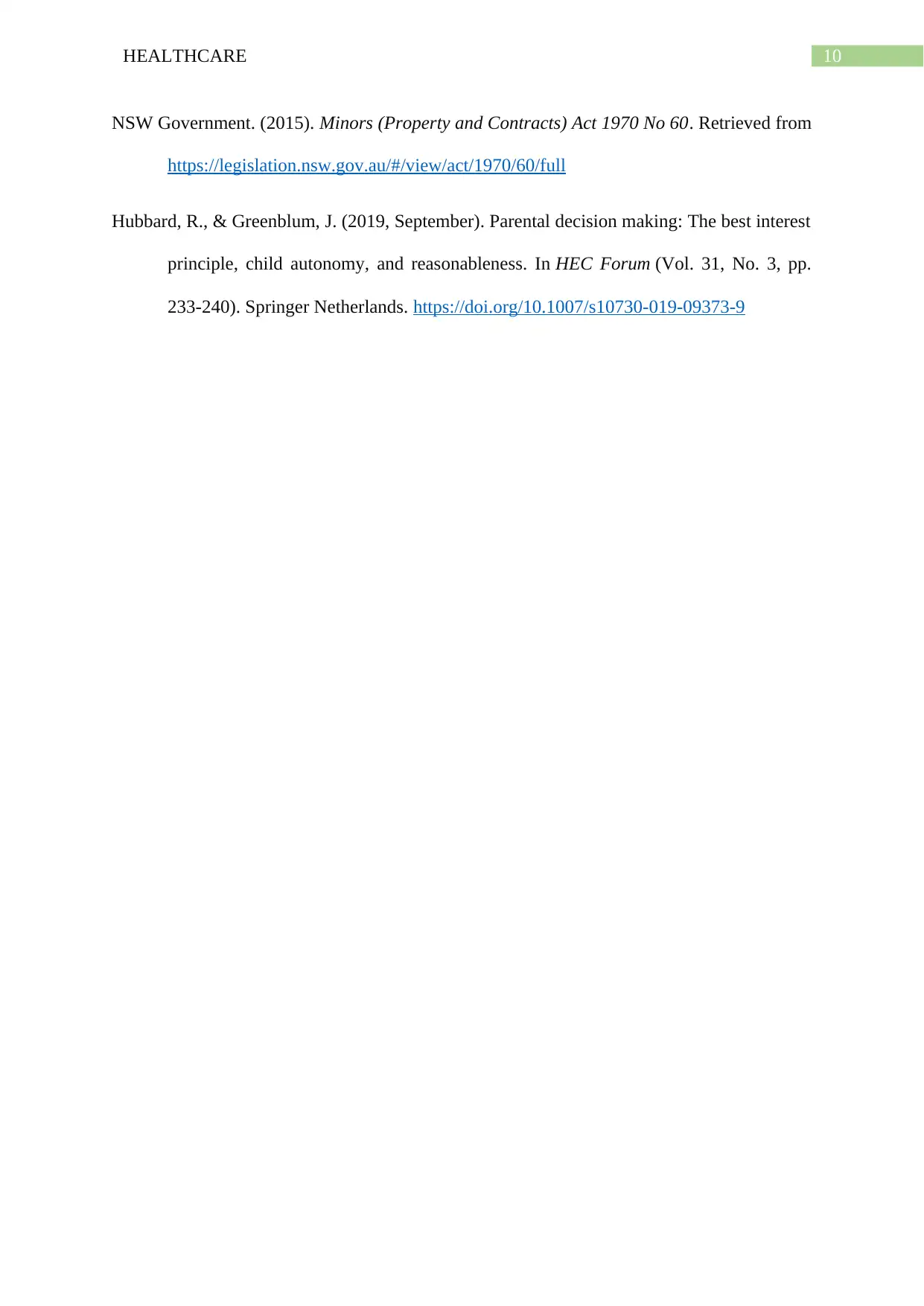
10HEALTHCARE
NSW Government. (2015). Minors (Property and Contracts) Act 1970 No 60. Retrieved from
https://legislation.nsw.gov.au/#/view/act/1970/60/full
Hubbard, R., & Greenblum, J. (2019, September). Parental decision making: The best interest
principle, child autonomy, and reasonableness. In HEC Forum (Vol. 31, No. 3, pp.
233-240). Springer Netherlands. https://doi.org/10.1007/s10730-019-09373-9
NSW Government. (2015). Minors (Property and Contracts) Act 1970 No 60. Retrieved from
https://legislation.nsw.gov.au/#/view/act/1970/60/full
Hubbard, R., & Greenblum, J. (2019, September). Parental decision making: The best interest
principle, child autonomy, and reasonableness. In HEC Forum (Vol. 31, No. 3, pp.
233-240). Springer Netherlands. https://doi.org/10.1007/s10730-019-09373-9
1 out of 11
Related Documents
Your All-in-One AI-Powered Toolkit for Academic Success.
+13062052269
info@desklib.com
Available 24*7 on WhatsApp / Email
![[object Object]](/_next/static/media/star-bottom.7253800d.svg)
Unlock your academic potential
Copyright © 2020–2026 A2Z Services. All Rights Reserved. Developed and managed by ZUCOL.





